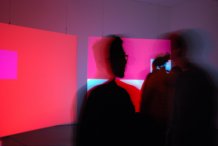
The three-year project, called “Documenting digital art: re-thinking histories and practices of documentation in the museum and beyond”, is funded by the Arts and Humanities Research Council.
New research to find innovative solutions for documenting digital art
New work by academics and curators will provide museums with innovative solutions for documenting, collecting and displaying digital art.
Currently written descriptions, questionnaires, photos or at times video recordings are used to document digital art in museums, primarily from the point of view of the artist. The research will analyse existing strategies and also focus on creating innovative documentation methods, including virtual reality, motion tracking, social media and interactive recordings, as well as changing the perspective by emphasizing audience engagement with digital art.
The three-year project, called “Documenting digital art: re-thinking histories and practices of documentation in the museum and beyond”, is funded by the Arts and Humanities Research Council. It will be led by Professor Gabriella Giannachi, Director Centre for Intermedia and Creative Technologies, University of Exeter, assisted by the curator Dr Francesca Franco from the University of Exeter, Dr Annet Dekker and Katrina Sluis from London South Bank University, and Gaby Wijers Director of LIMA. Project partners include the Venice Biennale, The Photographers’ Gallery in London, and LIMA a world leading media arts organisation in Amsterdam.
In cooperation with world-leading museums, artists, researchers and curators specialising in photography and digital art, they will analyse how digital art has been documented from the 1970s to the present day in museums and art galleries. They will look at existing practices and develop novel strategies for documenting, exhibiting and preserving digital art.
Professor Giannachi said: “There is currently no framework for museums to capture audience engagement with digital artworks. Using the same principles as documenting objects or even performances is not an effective way of documenting the values of digital art and capturing engagement with it. We will look at documentation as a strategy for exhibition, preservation and public engagement looking at novel forms of art. We will help museums to document dimensions of these works that are often currently overlooked, such as the human computer interaction and audience engagement.”
Paul Meller, Head of Creative Arts and Digital Humanities at the Arts and Humanities Research Council said “We are pleased to fund this project, which not only supports museums but also has the potential to engage a wider audience with digital art. We look forward to seeing how this project evolves over the next three years and the impact this could have for museum sector and beyond.”
The project will include an exhibition of computer art at the Venice Biennale curated by Dr Franco, a symposium and two workshops focused on the intersection of performance and digital art at LIMA, and other workshops and events about institutional practices on photographic documentation and audiences at The Photographers' Gallery. The research team will produce a book, catalogue, articles, a white paper, conference papers, two exhibitions, two sets of workshops, a film, public events, a repository, and a symposium.
About The Arts and Humanities Research Council
The Arts and Humanities Research Council, which is part of UK Research and Innovation, funds world-class, independent researchers in a wide range of subjects: history, archaeology, digital content, philosophy, languages, design, heritage, area studies, the creative and performing arts, and much more. This financial year the AHRC will spend approximately £98 million to fund research and postgraduate training, in collaboration with a number of partners. The quality and range of research supported by this investment of public funds not only provides social and cultural benefits and contributes to the economic success of the UK but also to the culture and welfare of societies around the globe.
Find out more about the AHRC at: ahrc.ukri.org, on Twitter at @ahrcpress, on Facebook at Arts and Humanities Research Council, or Instagram at @ahrcpress.
For media enquiries relating to the Arts and Humanities Research Council please contact:
Ellie Fry, Senior Communications Manager, Arts and Humanities Research Council
Ellie.fry@ahrc.ukri.org / 01793 416 030
Date: 14 March 2019
